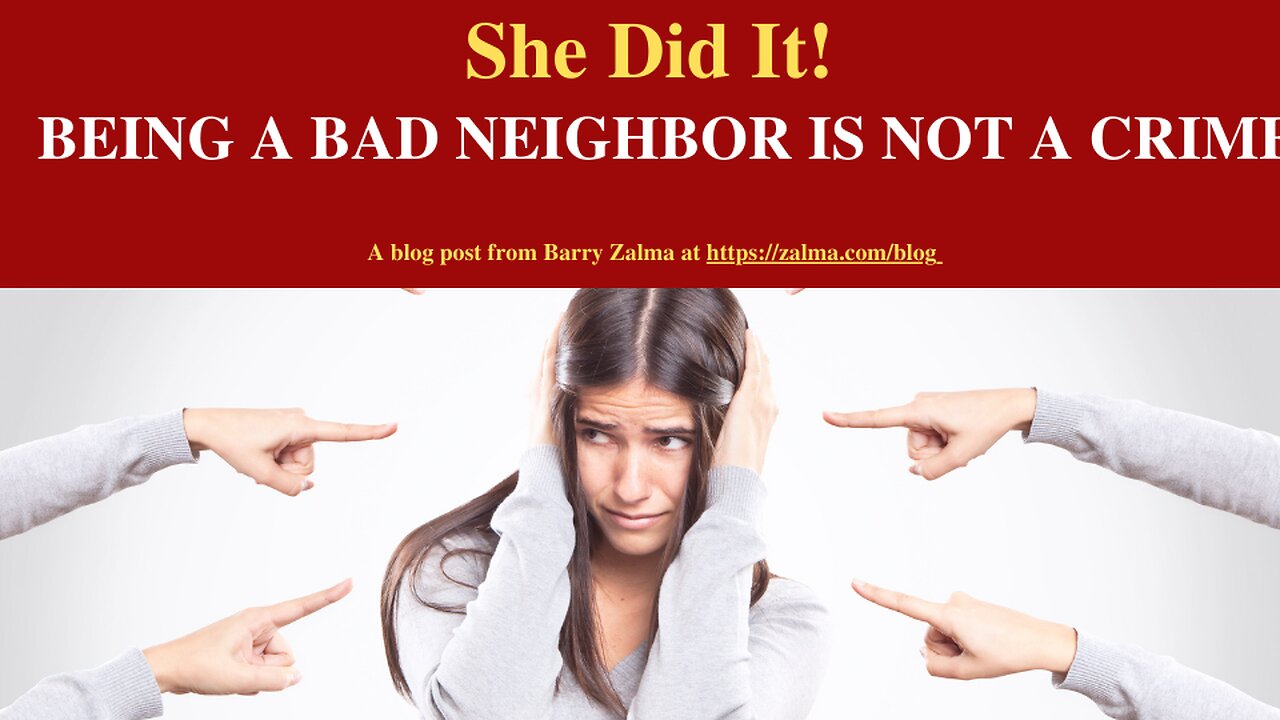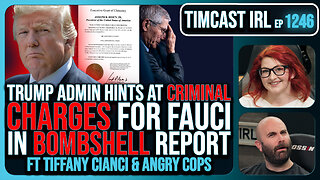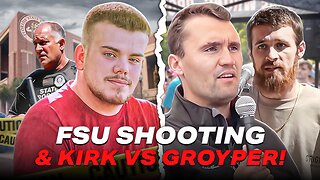Premium Only Content

Being a Bad Neighbor is not a Crime
She Did It
This is a fictionalized True Crime Story of Insurance Fraud from an Expert who explains why Insurance Fraud is a “Heads I Win, Tails You Lose” situation for Insurers. The story, and many other is my book "Insurance Fraud Costs Everyone" will help the public Understand How Insurance Fraud in America is Costing Everyone who Buys Insurance Thousands of Dollars Every year and Why Insurance Fraud is Safer and More Profitable for the Perpetrators than any Other Crime.
See the full video at and at https://youtu.be/7zm-lqdJMbI
Being a good neighbor is hard work. Sometimes it’s impossible. Marsha was not a good neighbor. She would “borrow” things from her neighbors and never return them. Most of her small kitchen appliances arrived because of such loans. Marsha had an extensive collection of CDs and long-playing records, none of which she purchased. Marsha would invite herself to lunch, but never invite her neighbors to her home for lunch.
She would play her stereo at its highest volume level at all hours of the day and night. Everyone who lived within six houses of Marsha lost sleep because of her actions. None of her neighbors liked Marsha.
Marsha kept a bull terrier named “Jaws” whom she did not allow in her house. Jaws, however, would escape the backyard weekly. Neighborhood cats, rabbits and small dogs disappeared with some regularity.
The entire neighborhood universally detested Marsha and Jaws. If Marsha ever decided to move, the neighbors would throw a going away party to which they would not invite her. Everyone in the neighborhood was afraid of Marsha and Jaws. They tolerated her because they did not know how to remove her from the neighborhood.
One summer evening while Marsha was attending a concert, burglars entered her house. Jaws, sensing the burglars in the house, barked furiously but could do nothing since Marsha tied him up in the backyard. The neighbors ignored Jaw’s barking since they were afraid to offend Marsha by complaining about the noise. Marsha lost her jewelry, two television sets, two VCR’s, her stereo set and her microwave oven.
The neighbors, when questioned by the police about the burglary, could only report that they heard the dog barking but saw nothing. Most smiled upon learning of the burglary and whispered under their breath their pleasure at Marsha’s loss.
Two days later Marsha’s adjuster arrived and parked in front of her house. On the adjuster’s car was a sticker identifying the company for which she worked. The adjuster spent an hour interviewing Marsha and considered the report to be that of a routine burglary. The adjuster asked Marsha to complete a form listing all of the personal property stolen, its purchase date, purchase price, replacement cost and its actual cash value. Once the adjuster received the list, she expected to go through the list, arrive at an actual cash value for the items and negotiate a quick settlement with Marsha.
Marsha’s neighbors had other plans. Harry and Louise, who lived next door, looked up the address of the insurance company in their telephone book. They then sat at an old Underwood manual typewriter and wrote a letter to the insurance company that said:
“We are neighbors of Marsha, the person you insure. We know she has reported a burglary at her house to the police and is making claim for losses due to that burglary.
“The claim is a fraud. Marsha’s house was not burglarized. She did not have the items she is claiming stolen.
“If you need further detail please call us at 555- 5555.”
They then signed their names. Three other neighbors did the same.
The insurance company, faced with the accusations, had no option but to report Marsha’s claim to the fraud division of the State of California Department of Insurance as a suspected fraudulent claim; assign investigation to its special investigation unit (SIU) and conduct a thorough investigation into the facts alleged.
The SIU investigator interviewed Harry and Louise and all of the other neighbors. They convinced the investigator that Marsha was not a credible person. The investigator believed Marsha was a despicable person. He knew she was the one who the three neighbors spoken to believed to be a fraud.
The insurance company retained the services of a lawyer to examine Marsha under oath and confront her with the accusations of fraud. The fraud division, faced with the compelling evidence of the statements of the neighbors, started its own investigation and presented the case the district attorney for prosecution.
Marsha, totally innocent and the victim of a crime, was dumbfounded. Her insurance company would not pay her claim and insisted on interrogating her endlessly in front of a court reporter. She could not understand the reasons for the interrogation. She explained to the lawyer for the insurance company why her claim was valid.
Marsha faced the lawyer for the insurance company with her sworn testimony that her claim was legitimate. He also had available the reasonable and the unsworn testimony of the three neighbors. There seemed to be compelling evidence that the claim was a fraud and equally compelling evidence it was a valid burglary claim.
The lawyer, the SIU investigator and a court reporter, went back to the home of Harry and Louise. They asked Harry and Louise to give testimony under oath to establish the fraud they had reported. Harry and Louise agreed to the sworn testimony and were ready to continue with their false accusations until the lawyer for the insurance explained to them the penalties of perjury. Harry and Louise decided that although Marsha deserved punishment for her lack of neighborliness, to have her punished was not worth prison. They told the truth. They explained to the lawyer why they had told the SIU investigator that they believed Marsha had committed fraud.
On the advice of counsel, the insurance company settled Marsha’s claim promptly. The Fraud Division was advised of the false report. Harry and Louise were not punished. No one told Marsha why it took so long to resolve her claim.
If the insurance company and its lawyers took Harry and Louise’s statement at face value and denied Marsha’s claim, the insurer would have faced a lawsuit from Marsha for falsely accusing her of the fraud.
The law of California, and several other states, now require that insurers have special fraud investigation units. The law requires that those specially trained investigators investigate claims of fraud to protect the insurer and the public from the crime. The SIU investigators, however, must remember that they are also claims people whose duty is to pay all legitimate claims and to investigate the basis for any denial thoroughly.
It was this thorough investigation, including the examination under oath of Marsha and the attempted sworn statement of the neighbors that saved Marsha from a possible criminal prosecution and the insurer from a bad faith lawsuit.
Every professional claims person understands that not all obvious frauds are fraud, not all innocent claims are innocent, and it is the obligation of every claims person and SIU investigator to thoroughly investigate every claim with the intent to find that a claimed loss is appropriate and compensable.
If fraud is proved by a thorough investigation then the claim should be denied and the person making the claim should face the ire of the local prosecutor or the US Attorney.
(c) 2023 Barry Zalma & ClaimSchool, Inc.
Subscribe and receive videos limited to subscribers of Excellence in Claims Handling at locals.com https://zalmaoninsurance.locals.com/subscribe.
Go to substack at substack.com/refer/barryzalma Consider subscribing to my publications at substack at substack.com/refer/barryzalma
Barry Zalma, Esq., CFE, now limits his practice to service as an insurance consultant specializing in insurance coverage, insurance claims handling, insurance bad faith and insurance fraud almost equally for insurers and policyholders. He practiced law in California for more than 44 years as an insurance coverage and claims handling lawyer and more than 54 years in the insurance business. He is available at http://www.zalma.com and zalma@zalma.com
Write to Mr. Zalma at zalma@zalma.com; http://www.zalma.com; http://zalma.com/blog; daily articles are published at https://zalma.substack.com. Go to the podcast Zalma On Insurance at https://anchor.fm/barry-zalma; Follow Mr. Zalma on Twitter at https://twitter.com/bzalma; Go to Barry Zalma videos at Rumble.com at https://rumble.com/c/c-262921; Go to Barry Zalma on YouTube- https://www.youtube.com/channel/UCysiZklEtxZsSF9DfC0Expg; Go to the Insurance Claims Library – https://zalma.com/blog/insurance-claims-library
-
 8:36
8:36
Barry Zalma, Inc. on Insurance Law
1 year agoZalma's Insurance Fraud Letter - January 15, 2024
274 -
 DVR
DVR
Man in America
7 hours agoEvidence of Highly Advanced Ancient Civilizations Is Being Hidden — But WHY!? w/ Jay Anderson
8.66K8 -
 2:15:10
2:15:10
TimcastIRL
3 hours agoTrump Admin Hints At CRIMINAL CHARGES For Fauci In BOMBSHELL Report w/Angry Cops | Timcast IRL
115K69 -
 LIVE
LIVE
SpartakusLIVE
5 hours agoDuos w/ GloryJean || Friday Night HYPE w/ The MACHINE
254 watching -
 3:47:23
3:47:23
Nerdrotic
8 hours ago $21.68 earnedFantastic 4 HER! Daredevil BORE Again SUCKS! Disney Star Wars is DESPERATE | FNT Vegas 350
107K16 -
 5:21:14
5:21:14
MyronGainesX
22 hours ago $13.72 earnedFormer Fed Explains FSU Shooting, Charlie Kirk vs Groyper Debate!
50.3K13 -
 DVR
DVR
IsaacButterfield
5 hours ago $0.27 earnedKaty Perry in Space?! Trans Women Law Controversy & Lizzo's Weight Loss Shocks Fans!
4.71K1 -
 LIVE
LIVE
Sm0k3m
2 hours agogaming night
28 watching -
 LIVE
LIVE
I_Came_With_Fire_Podcast
10 hours agoHOUTHIS & CHINA | MURDERER MERCH STORE | TRUMP SICK OF WAITING
526 watching -
 1:09:15
1:09:15
Keepslidin
1 hour agoIRL GAMBLING & GIVING PEOPLE MONEY WHEN THEY WIN
9023